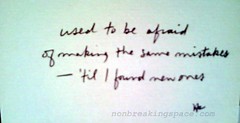It’s the end of January and the end of my first month of habit change.
What with everything that’s been going on for the last few weeks, I’m actually surprised at how well my meditation practice has been going. I’ve missed a couple of days here and there, and some of the days I did it my mind wouldn’t let me focus, but that’s not a bad record.
What I love about the Headspace app is the way it guides and supports you in achieving what you need to, as well as the way it explains meditation. Here’s what I’ve learned in the last few weeks:
Meditation can be a habit like any other
I meditate first thing in the morning, before I do anything else. It’s 15 minutes of my morning that sets me up for the rest of the day. The days I struggle with it are when my routine is disrupted for some reason, like at the weekends.
If I don’t have an alarm set and wake up naturally, I find it harder to settle myself and do a meditation session. I suspect this is because on weekdays my habit trigger is the alarm going off – I know what my first 2 hours of my day looks like and it’s kicked off with the alarm followed by meditation. Perhaps I need to find a different trigger so I don’t lose momentum when I’m not setting an alarm.
It’s OK to think
The biggest lesson I’ve learned is that meditation is not about not having thoughts, but rather about noticing those thoughts and bringing your focus back to the breath.
The problem I always used to have with meditation was getting cross with myself for thinking things and losing focus. Now I just recognise that I am thinking and bring my attention back to my breath. This has been particularly useful when I’ve been trying to meditate at times of high emotion and stress.
Anyone can do it
If you’ve ever thought that meditation just isn’t for you, give Headspace a try for free – their Take 10 programme is perfectly formulated to ease you into the process and learn more about yourself and the practice.
You will feel calmer
I used to be a very short-termpered person. It really didn’t take much for my fuse to be exhausted, and I’m not going to pretend that my new-found calmness is due to the last 30 days, but it is thanks to the collective experience of meditation in fits and starts for the last months.
That’s also not to say I’m now a picture of zen or incredibly boring; I still have the same passion and drive, the same energy and enthusiasm I’ve always had, I’ve just learned how to let things that I can’t do anything about slide past me without letting them annoy me or make me angry. And that makes commuting a lot more pleasant.
Give it a go
You’ll have gathered that I’m a fan, and I’d love you to try it. Check out Headspace or any other guided meditation app, or just read up on getting started from someone like Leo Babauta.
In February, I’m going to make sure I’m writing 500 words a day. Read more in tomorrow’s introductory post.



